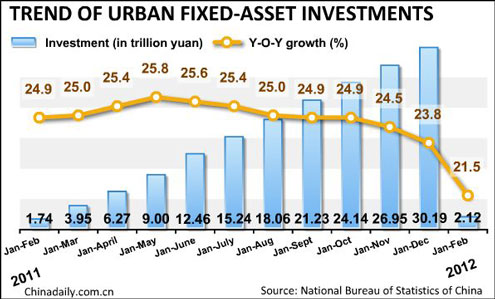 |
|
|
|
|||||||||||

BEIJING - China's urban fixed asset investment climbed 21.5 percent to 2.1189 trillion yuan ($336 billion) in the first two months of 2012 from a year earlier, the National Bureau of Statistics (NBS) said Friday.
The growth rate, down 2.3 percentage points year-on-year, dropped to its lowest level since 17.4 percent in 2002, the official data showed.
During the January-February period, investment in the primary industry jumped 43.9 percent year-on-year to reach 30.4 billion yuan.
Investment in the secondary industry totaled 893.9 billion yuan, up 24.9 percent, while that in the tertiary industry expanded 18.5 percent to 1.1946 trillion yuan.
Investment in the country's central regions grew fastest by 28.4 percent, followed by 28 percent in the western regions.
The more developed eastern regions registered an 18.8-percent increase in investment to hit 1.1619 trillion yuan, roughly 2.5 times the central region's total.
The data also showed the central government's investment slid 7.9 percent from a year earlier, while that of local governments expanded by 24 percent.
Spending on railway projects shrank a sharp 44 percent to 32.6 billion yuan, dragging down the overall investment growth.
Meanwhile, investment in property development jumped 27.8 percent to 543.1 billion yuan.
Money spent in building residential housing rose 23.2 percent, slowing from 30.2 percent last year, in line with sagging sales and falling property prices, as the government continued policy tightening.
The slowing investment data came after China lowered its GDP growth target in 2012 to a seven-year low of 7.5 percent earlier this week.
Investment, consumption and exports have been main growth engines for the world's second largest economy.
Fixed asset investment made up the lion's share of China's economic growth last year. But the country wants to reorient its economy toward domestic consumption.